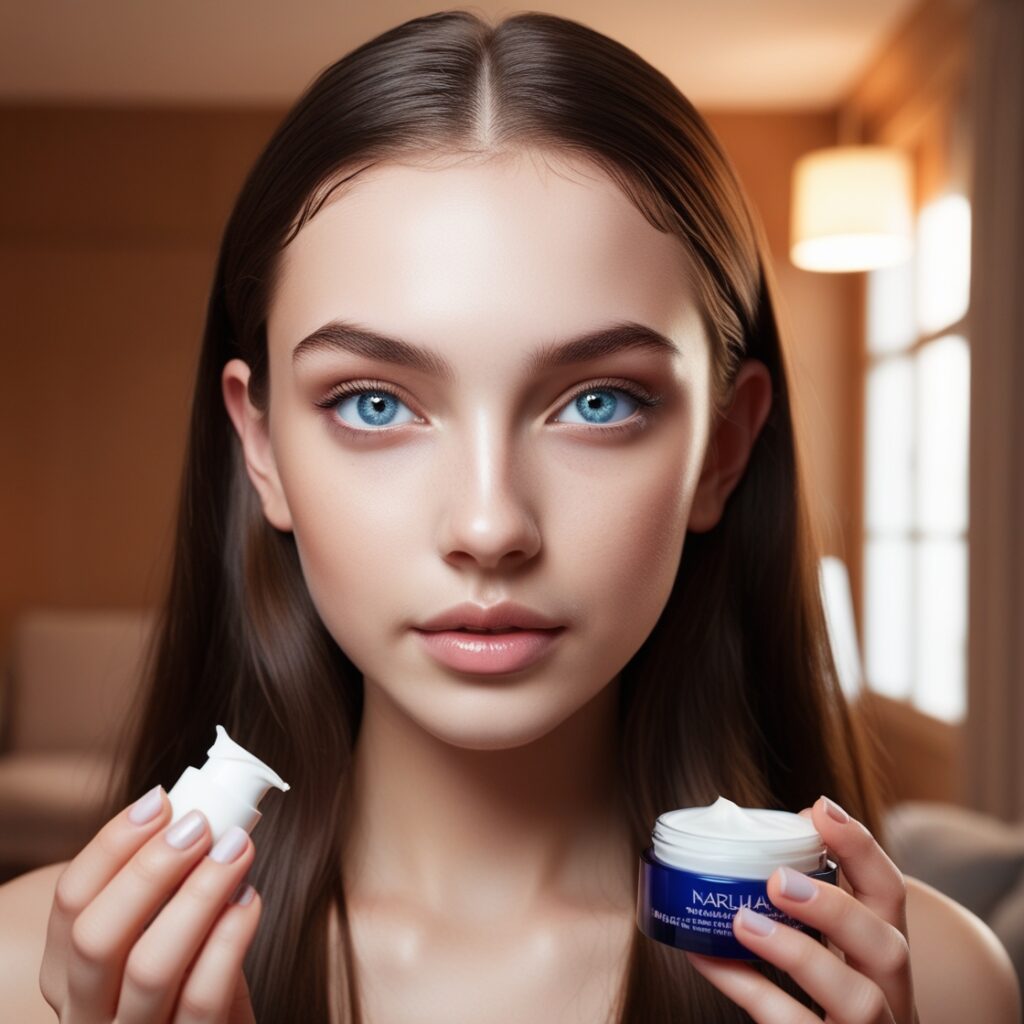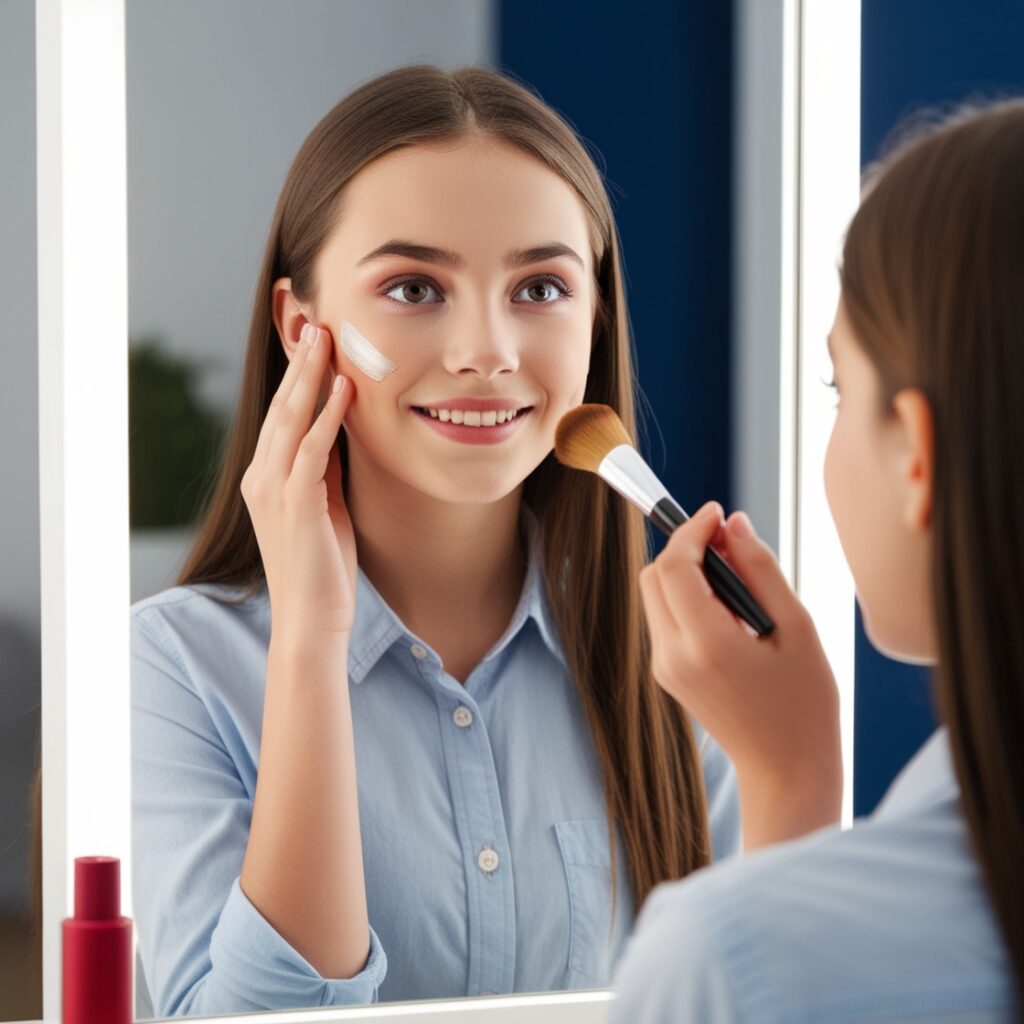Teenager skin care is so important, as during adolescence, both physical and mental changes occur as the body and mind transition from childhood to adulthood. As the body changes, so does the skin, with increased oil production often leading to acne—a common concern that can affect self-confidence. In the market, there are many types of cosmetics, and choosing the right products and tips can be challenging. That’s why teenager skin care focuses on creating a simple routine to manage common skin concerns like oiliness, acne, and sensitivity. With the right approach, teenagers can better understand their skin’s needs and address issues effectively while supporting their overall well-being.
Here, a basic guide to teenager skin care and solutions to some of the most important teenage concerns are discussed.

Teenager Skin Care Routine
1. Gentle Cleansing
A gentle cleansing routine is key to keeping teenage skin clear and healthy. During the teenage years, your skin is more likely to experience breakouts and oiliness due to hormonal changes, so it’s important to use products that are gentle but effective. Start by using a mild, soap-free cleanser twice a day that suits your skin type—whether it’s oily, dry, or combination. Avoid harsh scrubs or strong exfoliants that can irritate the skin and make problems worse. Use lukewarm water, as hot water can strip your skin of its natural oils, while cold water may not cleanse as effectively. Gently massage the cleanser into your skin using your fingertips, focusing on your forehead, nose, and chin (the T-zone) where oil tends to build up. Rinse thoroughly and pat your face dry with a clean towel. This simple step will remove dirt, excess oil, and makeup without drying out or irritating your skin, setting a fresh foundation for the rest of your skincare routine.
2. Moisturizing
Moisturizing is an essential step in any skincare routine, especially for teenagers. Even if your skin feels oily, it still needs hydration to stay balanced and healthy. Choose a lightweight, oil-free moisturizer if you have oily or acne-prone skin, or a richer formula if you have dry skin. The key is to find a moisturizer that works for your skin type. After cleansing, apply the moisturizer to damp skin to lock in moisture and prevent dryness. Gently massage it in using upward, circular motions, focusing on areas that tend to get drier, like your cheeks or around your eyes. Moisturizing helps maintain your skin’s natural barrier, keeping it soft, smooth, and hydrated throughout the day. It also ensures your skin stays protected from environmental factors like pollution and the sun. Don’t forget to moisturize in the morning and evening to keep your skin healthy and glowing.
3. Sun Protection
Sun protection is a crucial part of any skincare routine, especially for teenager skin care, as the skin is still developing and can be more sensitive to sun damage. Using sunscreen daily helps prevent premature aging, sunburn, and skin cancer. Even on cloudy days or indoors, UV rays can still affect your skin, so make it a habit to apply sunscreen every morning. Choose a broad-spectrum sunscreen with at least SPF 30 to protect against both UVA and UVB rays. If you have oily or acne-prone skin, look for an oil-free, non-comedogenic formula that won’t clog your pores. Apply a generous amount to all exposed skin, including your face, neck, ears, and hands, and let it absorb before applying makeup or going outside. Reapply every two hours, especially if you’re sweating or swimming. By protecting your skin from harmful UV rays, you’ll keep it looking fresh, clear, and youthful for years to come.
4. Acne Treatment
Acne is a common skin issue that many teenagers deal with during their adolescent years. It can often feel overwhelming, but it’s important to understand that there are effective treatments available. Keeping your skin clean is crucial, so wash your face gently twice a day with a mild cleanser to remove excess oil and dirt. For acne-prone skin, ingredients like salicylic acid (to unclog pores) and benzoyl peroxide (to reduce bacteria) can be effective. Spot treatments can be applied directly to pimples, while gentle exfoliation a few times a week can help manage dead skin cells. Avoid overusing products, as this can irritate the skin.
5. Healthy Habits
Maintaining healthy skin involves a holistic approach encompassing diet, lifestyle, and skincare practices. A balanced diet rich in fruits, vegetables, and antioxidants helps nourish skin cells from within, promoting a healthy glow. Staying hydrated by drinking plenty of water, eating a balanced diet, and managing stress can positively impact the skin. Regular exercise helps, but be sure to cleanse skin after workouts to prevent breakouts.
6. Avoid Harsh Products
For teenager skin care, it’s crucial to avoid harsh products that can strip away natural oils and cause irritation. Strong, abrasive scrubs or overly drying treatments may seem like they’re tackling acne or excess oil, but they can damage the skin’s protective barrier, leading to dryness, redness, and even more breakouts. Instead, opt for gentle, soothing cleansers and treatments with mild ingredients. Harsh products can also make the skin more sensitive to environmental factors, like the sun, which can worsen the condition. Focus on products designed specifically for teenage skin—those that cleanse, hydrate, and treat without causing further irritation. Gentle care ensures that your skin remains balanced, healthy, and protected.
7. Hands Off The Face
“Hands off the face” is an important rule in any skincare routine, especially for teenagers. Throughout the day, your hands pick up bacteria, dirt, and oils from surfaces, and when you touch your face, you’re transferring these impurities, which can lead to breakouts and skin irritation. Picking or squeezing pimples can also cause scarring and spread bacteria, making acne worse. To keep your skin clear, try to avoid resting your hands on your face or touching it unnecessarily. Always wash your hands before applying skincare products and keep your phone, pillowcases, and anything else that touches your face clean. This simple habit helps protect your skin from unnecessary bacteria and keeps it healthier in the long run.
8. Stay Consistent
Staying consistent with your skincare routine is key to seeing lasting results, especially for teenage skin. It’s easy to get impatient or skip steps, but clear, healthy skin takes time and care. Follow your routine daily, even when you don’t see instant improvements. Cleanse, moisturize, and apply sunscreen every morning and night, and stick with your acne treatments or other targeted solutions as recommended. Consistency helps balance your skin, prevent breakouts, and maintain a smooth complexion. Remember, your skin is constantly changing, so give your routine a few weeks to show its effects. By making skincare a daily habit, you’ll nurture your skin’s health and build a solid foundation for long-term beauty.
A dermatologist can offer additional guidance and recommend safe, teen-appropriate products, especially if acne or other skin concerns are more severe.

Habit You Should Acquire for Teenager Skin Care
Avoid Touching Your Face
Touching your face might seem harmless, but it can actually have a big impact on your skin’s health. Our hands come into contact with all sorts of surfaces and, as a result, pick up bacteria, dirt, and oils throughout the day. When you touch your face—whether it’s brushing hair out of your eyes, resting your chin on your hand, or picking at a pimple—you’re transferring all those impurities to your skin. This can clog pores and lead to breakouts, especially if you already have acne-prone or sensitive skin.
Stay Hydrated
Staying hydrated is one of the simplest and most effective ways to maintain healthy, glowing skin. Water plays a crucial role in every function of the body, including skin health. When you’re well-hydrated, your skin is better equipped to retain moisture, which keeps it soft, smooth, and more resilient. Hydrated skin can also heal and regenerate more effectively, helping it bounce back from sun exposure, minor irritations, and other environmental stressors.
Eat a Balanced Diet
Eating a balanced diet is essential for maintaining healthy skin, especially during adolescence when your body is growing and undergoing hormonal changes. A balanced diet includes a variety of nutrient-dense foods, such as fruits, vegetables, whole grains, lean proteins, and healthy fats. Each of these food groups provides important vitamins and minerals that play a role in skin health. On the other hand, it is best to avoid excessive consumption of refined sugars, processed foods, and fatty or fried alternatives, as they can contribute to breakouts, acne, inflammation, oily skin, and loss of skin glow.
Choose Makeup Wisely
Choosing makeup wisely is crucial for maintaining healthy skin, especially for teenagers who may be more prone to breakouts and sensitivity. Not all makeup products are created with skin health in mind; some contain ingredients that can clog pores, irritate sensitive skin, or exacerbate acne. When selecting makeup, it’s a good idea to look for products labeled “non-comedogenic” or “oil-free,” as these are less likely to clog pores and cause breakouts.
Don’t Overdo Acne Treatments
When it comes to acne treatments, less is often more. It’s common to feel tempted to apply multiple acne-fighting products or use them in larger amounts, but this can actually make things worse. Overusing acne treatments, especially those with strong active ingredients like benzoyl peroxide, salicylic acid, or retinoids, can dry out and irritate your skin, leading to redness, peeling, and an increase in oil production as your skin tries to compensate for the dryness. This can end up causing more breakouts instead of less.
Get Enough Sleep
Getting enough sleep is essential for healthy skin, as well as overall well-being, especially during teenage years when the body and skin are still developing. Sleep is a restorative time when the body repairs itself, and this includes repairing and regenerating skin cells. When you get adequate rest, usually between 7-9 hours per night, your body has time to recover from the stress of the day, which can help reduce skin issues like inflammation and breakouts.

Common Mistake of Teenager Skin Care
Over-Washing The Skin
Over-washing the skin is a common mistake many teenagers make when trying to keep their skin clear, especially when dealing with acne. The idea is often that washing more frequently will help get rid of excess oil and prevent breakouts, but in reality, washing your face too much can do more harm than good. Stick to cleansing twice a day with a gentle, pH-balanced cleanser.
Skipping Sunscreen
Skipping sunscreen is one of the most common skin care mistakes among teenager, yet it is one of the most important habits to incorporate into your daily routine. Many teens believe that sunscreen is only necessary on sunny days or during the summer, but this is far from the truth. Sun exposure can damage the skin even on cloudy days or in cooler weather, and this damage builds up over time, leading to premature aging, dark spots, and, more seriously, an increased risk of skin cancer.
Using Too Many Acne Products
Using too many acne products is a common mistake among teenagers eager to get clear skin quickly. It’s understandable to want fast results when dealing with breakouts, but bombarding your skin with multiple acne treatments at once can actually do more harm than good. The problem with overloading your skin with acne products, especially those containing strong ingredients like benzoyl peroxide, salicylic acid, or retinoids, is that it can lead to excessive dryness, irritation, and sensitivity.
Picking at Pimples
Picking at pimples is one of the most tempting, yet damaging, habits many teenagers struggle with when dealing with acne. While it might seem like a quick way to get rid of a pimple, picking at blemishes can actually make things much worse in the long run. When you pick or squeeze a pimple, you’re not only introducing bacteria from your hands into the skin but also applying pressure, which can cause the pimple to rupture deeper beneath the surface. This can lead to more swelling, redness, and inflammation, making the pimple more noticeable.
Using The Wrong Products For Their Skin Type
Using the wrong products for your skin type is a common mistake among teenagers, and it can lead to various skin issues, including breakouts, dryness, irritation, or excessive oiliness. Everyone’s skin is different, and products that work well for one person might not be suitable for another. That’s why understanding your skin type is crucial for building an effective skincare routine.

Teenager Skin Care Queries and Concerns
How To Get Rid Of Teenage Acne
Getting rid of teenage acne requires a combination of the right skincare habits, treatments, and lifestyle changes. Acne is a natural part of adolescence due to hormonal fluctuations, but with the right approach, it can be managed effectively.
The first step in managing acne is establishing a consistent skincare routine. Gently cleanse your face twice a day with a mild, non-comedogenic cleanser to remove dirt, oil, and makeup. Avoid harsh scrubbing, as it can irritate the skin and make acne worse. After cleansing, use an oil-free moisturizer to keep the skin hydrated and balanced—dry skin can trigger more oil production, leading to further breakouts. Don’t forget sunscreen! Protecting your skin from the sun with a broad-spectrum SPF of 30 or higher is essential, as sun exposure can worsen acne and cause scars.
I love Makeup. Is it Okay To Apply it Every Day?
If you love makeup, it’s completely fine to wear it every day, as long as you follow a few key skincare practices to keep your skin healthy. Applying makeup regularly can be fun and a great way to express yourself, but it’s important to take steps to ensure your skin doesn’t suffer from daily use.
One of the most important things to remember is to always remove your makeup at the end of the day. Leaving makeup on overnight can clog your pores and lead to breakouts. Use a gentle makeup remover followed by a cleanser suited for your skin type to ensure all traces of makeup are gone. Regularly cleansing your skin helps prevent buildup, which can cause acne and dullness.
I Enjoy Spending a Lot of Time in Front of The Mirror. Is That Normal?
Spending time in front of the mirror can be completely normal, and many people do it for various reasons. For some, it’s a way to check their appearance, adjust their makeup, or simply reflect on how they feel. It’s natural to want to look your best, and mirrors provide a way to connect with your own image, especially when trying out new looks or taking care of your skincare routine.
However, if you find yourself spending a lot of time in front of the mirror due to self-criticism, negative body image, or constant worry about your appearance, it’s important to recognize that this could be a sign of deeper concerns. Sometimes, excessive focus on physical appearance may be linked to insecurities or a desire for validation. In such cases, it’s helpful to take a step back and remind yourself of the qualities beyond looks that make you who you are, like your talents, kindness, and personal growth.
Ultimately, if spending time in front of the mirror feels like a positive and healthy habit, there’s no need to worry. It’s all about balance—finding time to care for your appearance while also embracing and nurturing other aspects of yourself.
Which Creams And Moisturizers Are Suitable For My Skin?
Choosing the right creams and moisturizers for your skin depends on your skin type and specific needs. If you have oily skin, look for lightweight, oil-free, or gel-based moisturizers that hydrate without clogging pores. Ingredients like hyaluronic acid and glycerin are great for providing moisture without adding excess oil. Non-comedogenic products are key to prevent breakouts.
For dry skin, a richer, more hydrating moisturizer is ideal. Look for creams that contain ingredients like ceramides, shea butter, or aloe vera, which help lock in moisture and repair the skin barrier. Thick, emollient creams can create a protective layer that prevents moisture loss throughout the day.
If you have combination skin, you might need a moisturizer that balances both hydration and oil control. Opt for a product that is lightweight but still hydrating, focusing on areas of dryness while not over-moisturizing the oilier areas. Gel-based or water-based moisturizers work well for this skin type.
For sensitive skin, look for fragrance-free and hypoallergenic moisturizers that are gentle on the skin. Ingredients like calendula, chamomile, and aloe vera can soothe irritation and reduce redness. Always patch-test new products to ensure they won’t cause any reactions.
Lastly, if you have acne-prone skin, look for moisturizers labeled as “non-comedogenic” to avoid clogging pores. Gel-based or oil-free formulas are usually best, and those containing soothing ingredients like niacinamide or salicylic acid can help reduce acne without drying out your skin.
By selecting products that cater to your skin type, you can keep your skin healthy, hydrated, and balanced.
Should I Apply Sunscreen Daily?
Yes, applying sunscreen daily is essential for maintaining healthy skin. Even if you’re not spending a lot of time outdoors, UV rays can still reach your skin and cause damage. UVA and UVB rays, which are present even on cloudy days or indoors near windows, can lead to premature aging, sunburn, and an increased risk of skin cancer over time.
Daily sunscreen application helps protect your skin from these harmful rays. It can prevent sunburn, dark spots, and wrinkles, and it also helps to maintain an even skin tone. Sunscreen is especially important if you’re using products like retinoids or acne treatments, as these can make your skin more sensitive to the sun.
Ideally, use a broad-spectrum sunscreen with SPF 30 or higher, and apply it every morning, even on days when you stay inside or it’s cloudy outside. If you’re exposed to direct sunlight for prolonged periods, reapply every two hours. Incorporating sunscreen into your daily skincare routine is a simple yet powerful step in protecting your skin from long-term damage.
Can I Wax My Face?
Yes, you can wax your face as a teenager, but it’s important to be careful and make sure you’re doing it the right way. Waxing is a popular method for removing facial hair, especially on areas like the upper lip, eyebrows, or chin. It can give you smooth, hair-free skin for weeks, but since the skin on your face is more sensitive than the rest of your body, you need to take extra care to avoid irritation.
Before waxing, always do a patch test on a small part of your skin to check for any allergic reactions or sensitivity. If you have acne or sensitive skin, you might want to avoid waxing, as it can sometimes cause irritation or make breakouts worse. If you’re unsure, it’s a good idea to talk to a dermatologist or a trusted adult before trying it.
When waxing at home, use a wax specifically made for facial hair, and follow the instructions carefully. Make sure your skin is clean and dry before applying the wax, and never wax over the same area more than once to avoid injury or irritation. If you’re nervous about doing it yourself, you might want to visit a professional esthetician who can wax your face safely and properly.
After waxing, be sure to moisturize and avoid sun exposure for a day or two to protect your skin. If you’re new to waxing, it’s always a good idea to start slow and see how your skin reacts before doing more areas. With proper care, waxing can be an effective way to keep your face smooth and hair-free, but make sure to always listen to your skin!
